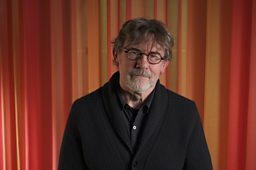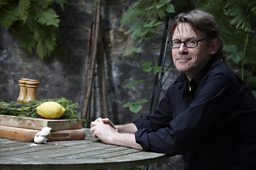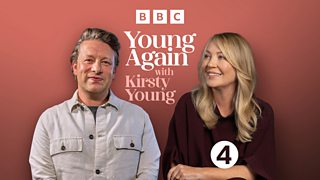Nigel Slater: Seven things we learned when he spoke to Kirsty Young
In her 大象传媒 Radio 4 podcast Young Again, journalist and broadcaster Kirsty Young asks fascinating people what advice they would like to give their younger self.
Nigel Slater describes himself as “a cook who writes”, but many would argue those skills deserve equal billing. His recipe books – he’s written more than 20 – are equally beloved for his evocative writing as his unpretentious, delicious creations.
His 2003 memoir, Toast: The Story of a Boy's Hunger, became a massive bestseller, with over 300,000 copies sold. Even if it might not be a term he’d use himself, he is undeniably a national treasure. He talks to Kirsty about a childhood marked by joy and tragedy, his path to happiness, and why he’s happy not being in love. Here are seven things we learned.

1. His childhood is remembered in Christmases
Nigel was born in Wolverhampton in 1956. His wasn’t an easy childhood, but his earliest happy memories are of Christmas. “Everything that I love about Christmas, whether it’s carols, fairy lights, the tree, opening Christmas cards – it’s all the things that really made life feel special when I was a kid,” he says.
“Thinking back, I can’t remember the summers very much. Not really. I know that we used to go to the beach and we used to make great sandcastles, but it’s the Christmases that I remember. Particularly the ones when it snowed.”
2. He wrote his first cookbook at eight
Nigel always knew he loved to cook. “I was probably about eight when I wrote a little cookbook of my own recipes,” he says. “I did little paintings – watercolours – and there was this feeling that maybe one day I might write a cookbook. I remember [Mum] being amused by this cookbook… I think she was quite proud that I’d done it. I’d love her to know that some of the things I dreamt about did come true. That I have had a career that is all about the things I love doing: cooking, writing and reading. All the things that gave me joy, that I’m still getting joy from now.”
3. He regrets his last words to his mother
“The last words you say to somebody you love, you want them to be the most wonderful words you could ever say,” says Nigel. His mother died, from severe asthma, when he was nine years old. In his memoir, Toast, which was later turned into both a film and a play, Nigel details a conversation he wishes had never happened.
He and his mother were making mince pies, a tradition that meant everything to young Nigel. “I said, ‘Where’s the mincemeat?’ And she’d forgotten to buy it… I was so devastated. She started coughing and wheezing and I just said, ‘I hope you die.’ I didn’t know. I was nine. I was shielded from the fact mum wasn’t very well. She died soon afterwards and I’ve carried that around for years… I’d give anything not to have said that.”

4. He had a difficult relationship with his father
While he was very close with his mother, Nigel wasn’t very close to his dad. He hoped one of his children would take over the family engineering business, which neither Nigel nor his siblings wanted.
“He let it be known that I was a disappointment to him,” says Nigel. Asked when he came to terms with that, he says, “Probably not until he died, because he never let me forget it, really. I was 16 [when he died]. You didn’t argue with my dad. He was a bully. I didn’t have a particularly happy adolescence.”
When his father died, Nigel had a complex reaction. “It was almost a feeling of freedom. The bullying was over. This disappointment that I was carrying around on my shoulders – I was disappointing this man who was so important to me – it suddenly went. I felt free.”
5. He didn’t enjoy being a chef
Nigel earned a qualification in catering and thought he’d go on to be a chef. “I’d always wanted to be a chef,” he says. “I assumed I’d be a chef. Then I realised that what I actually enjoyed was the cooking. The problem with trying to be a chef is it’s about teamwork. I didn’t really do teamwork.”
He loved preparing food on his own terms. “When I’d make something at home, whatever it was, I did it at my own pace. If your order has got to go out to table six, one chef has got to get the meat out at exactly the same time as I’ve got the vegetables out. It’s timing. It’s teamwork. I could cook. I loved cooking, but I was not going to be a chef.”
6. He’s sceptical about falling in love
“I could not be happier [than] when I’m not in love,” says Nigel. “Lots of things I don’t want in my life go hand in hand with being in love, which is things like compromise, having to do what other people want, not getting my own way… Which makes me sound like a very bad person.”
He has been in love, but at 68 he’d rather not do it again. “I think it’s a lot of work being in love with somebody… There is almost a helplessness about it. I don’t want to feel that way.”
7. Food, to him, is love
“The happiest times of my life were when I was eating,” Nigel says. “When I think of my childhood, I measure it in the food that I ate; things I really enjoyed. Mum used to make oat flapjacks. I remember coming home on cold winter days and I could smell them before I opened the door.”
He goes on, “Very often, the food that you remember is food that was made for you. Somebody somewhere was saying, ‘I care enough to cook for you. I love you’… It brings back so many memories when you eat something from your childhood that you love. It just opens those doors to those wonderful memories.”






